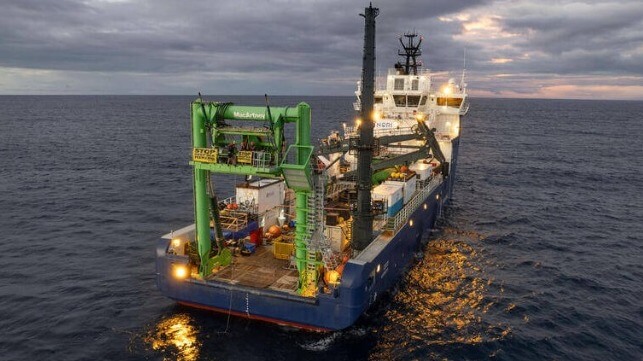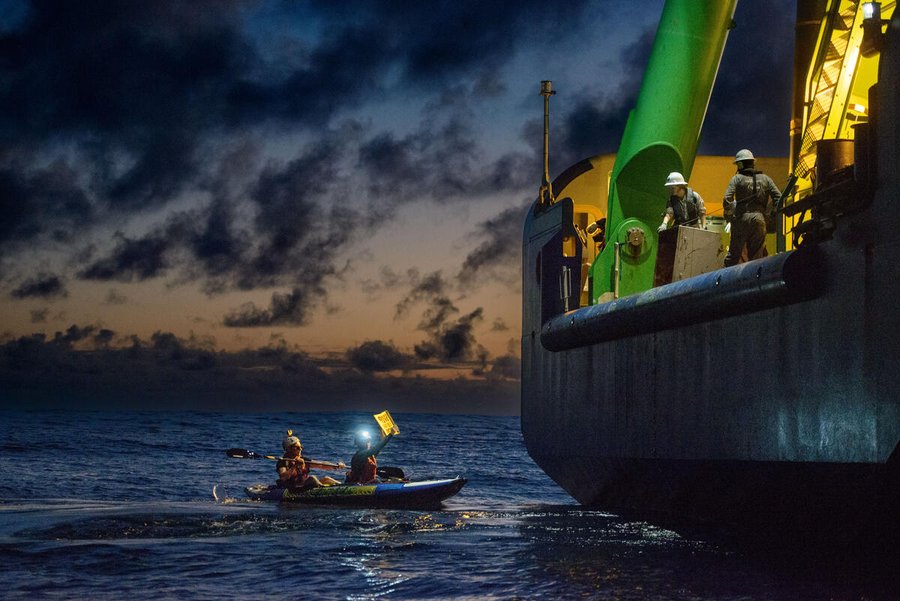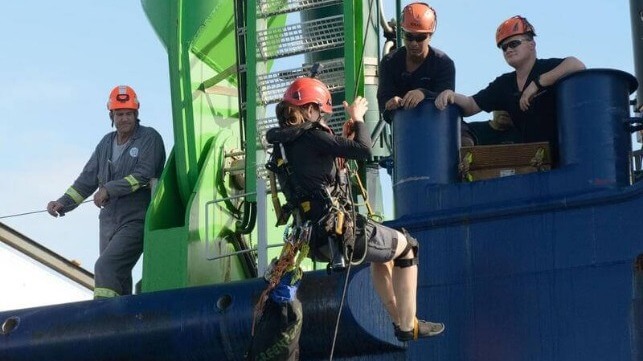Court Orders Greenpeace Activists Off Deep-Sea Mining Ship

A court in the Netherlands has ordered Greenpeace to remove a group of activists from the deep sea mining research ship Coco, which is currently on station in the Clarion-Clipperton Zone to evaluate a polymetallic nodule site.
Last week, the Greenpeace vessel Arctic Sunrise met up with the Coco and launched an attempt to block its operations. It deployed a pair of kayaks and a pair of Zodiacs to get near to Coco's hull, and it sent a team of climbers aboard to occupy the Coco's A-frame platform. The operation has prevented the crew of the Coco from carrying out the vessel's assigned mission of collecting data on conditions on the bottom.
Coco's charterer, The Metals Company (TMC), filed suit in the Netherlands through its subsidiary NORI. The suit called for an injunction to order Greenpeace to immediately cease and desist.
On Thursday, a district court judge in Amsterdam granted the request and ordered the activists to vacate the ship. The order would impose a fine of about $55,000 a day if Greenpeace fails to comply. However, the judge also said that it was "understandable" that the group wanted to protest deep sea mining, as TMC's activities could have "possibly very serious consequences" for the environment.
The judge did not grant TMC's request for an order to require Arctic Sunrise and its boats to stay 500 meters back from the ship. This opening allows the activists' Zodiacs to continue to operate in close proximity to the research vessel.
“This is without question a massive setback for the deep sea mining industry. The Dutch court not only affirmed Greenpeace’s right to protest but also agreed that nodule mining is a highly controversial activity," said Mads Christensen, head of Greenpeace International.
According to TMC, Greenpeace's climb team complied with the court order right away and disembarked the Coco.
In a statement, Greenpeace said that TMC "can't stand that Greenpeace is watching and opposing them at every turn," and accused the firm of attempting to avoid scrutiny.
TMC responded that it respects Greenpeace's right to protest and exercise free speech, but that the group must do so without interfering with the ship's operations. "Our foremost responsibility is to ensure the safe continuance of our legally-mandated operations, and the safety of all those involved," said TMC CEO and Chairman Gerard Barron. "Greenpeace are free to protest from a safe distance and to assert their opinion, but theirs is not the only one that matters."
24 nations and 800 experts have called for a moratorium on deep-sea mining until after more research has been done on the potential impact on marine life. The Clarion-Clipperton Zone is little studied, and scientific surveys of the area often uncover new species (sometimes dozens of them). Critics of deep-sea mining warn that potential impacts - sediment plumes blanketing nearby areas, toxins released into the water column from mining wastes, habitat destruction from the removal of the nodules themselves - are unknown and potentially harmful to native species.
Judge orders Greenpeace off seabed mining ship in ocean standoff
Bloomberg News | November 30, 2023 |

After five days of a non-stop kayak activity around the MV COCO, the vessel was safely climbed by five Greenpeace International activists on November 25. Credit: Greenpeace
A Dutch court on Thursday ordered activists from Greenpeace International to leave a deep sea mining research ship that they have been occupying in the Pacific Ocean for the past week. However, the activists are allowed to continue protesting on the water around the vessel, the judge ruled.

The research expedition is being conducted by a subsidiary of The Metals Company (TMC), a Canadian-registered firm that next year plans to apply for the world’s first license to mine the deep sea for valuable minerals in international waters.
With opposition to mining biodiverse deep sea ecosystems growing, Greenpeace International sent its ship the Arctic Sunrise to intercept the TMC-chartered vessel, the MV Coco. On Saturday, Greenpeace activists boarded the Coco and climbed a winch used to lower equipment to the ocean. Greenpeace said they would remain until TMC called off the expedition.
Greenpeace is registered in the Netherlands; on Tuesday, TMC asked the Amsterdam District Court to end the protest, which it said was costing the company $1 million a day. Scientists aboard the Coco had been collecting data on the impact of a test mining operation TMC conducted in 2022 at a remote site in the Pacific between Mexico and Hawaii.
In its ruling Thursday, the court found that Greenpeace had a right to stage the demonstration under the European Convention on Human Rights, but could not stay aboard the Coco indefinitely and interfere with the ship’s operations.
“Greenpeace’s protest is directed against an issue of great social importance,” wrote Judge I.H.J. Konings. “The interest in preventing a serious accident outweighs Greenpeace’s interest in continuing the action on the Coco, which has been going on for just under a week and has already allowed Greenpeace to make its point.”
But the judge rejected TMC’s contention that the activists had damaged the Coco, as well as a request that they be barred from coming closer than 500 meters (1,640 feet) to the ship. TMC had cited a directive to remain 500 meters away that was issued to Greenpeace on Monday by Michael Lodge, secretary-general of the International Seabed Authority. The United Nations-affiliated ISA regulates deep sea mining.
“This appears to be a call, not an enforceable measure,” the judge wrote of the ISA’s directive. “It is unclear to what extent this authority is authorized to actually impose the measures mentioned on [in this case] Greenpeace.”
After the ruling, the Greenpeace activists departed the Coco, according to Louisa Casson, a deep sea mining campaigner aboard the Arctic Sunrise. She said Greenpeace launched two small boats today to encircle the Coco as it had done in the days prior to four activists boarding the ship on Saturday.
“The ISA Secretariat should learn from Greenpeace International activists as an example of a bold fight back against the destruction of this still unknown ecosystem,” Casson said.
TMC also hailed the ruling. “We are pleased with today’s court opinion,” TMC chief executive officer Gerard Barron said in a statement. “We respect Greenpeace’s right to peaceful protest and expression of opinions. However, our foremost responsibility is to ensure the safe continuance of our legally-mandated operations, and the safety of all those involved.”
(By Todd Woody)
Deep-Sea Mining Company Sues Greenpeace to Remove Activists From Ship

A small group of protesters from Greenpeace have hung up the operations of the deep-sea mining research vessel Coco, prompting the vessel's charterer to file a lawsuit seeking an injunction, the activist group said Tuesday.
Coco is on assignment in the Clarion-Clipperton Zone to evaluate a polymetallic nodule lease area. The Greenpeace vessel Arctic Sunrise rendezvoused with the vessel in order to interfere with its mission. On the water, Greenpeace has used two kayaks and two small boats to obstruct the ship's operations. In addition, a five-person climb team boarded the Coco's stern-mounted A-frame using a hook, rope and ascenders. The activists climbed up to the platform at the structure's top and occupied it in hopes of blocking operations.
According to Greenpeace, the Coco's charterer - NORI, a subsidiary of The Metals Company (TMC) - has filed suit in the Netherlands in order to force Greenpeace to halt the protest. The group says that NORI is seeking a fine of about $10 million if the protesters continue to block the ship's operations.
Greenpeace has shown no sign of giving up the protest, and NORI says that it has been given to understand that the disruption will continue until Coco leaves the mineral exploration area.
“Two kayaks, two small boats and five climbers have rocked this wannabe extractive industry to its core. This is the importance of peaceful activism and bearing witness to an industry that has always operated in the shadows. We will not look back and regret standing up when we had the chance to stop deep sea mining from ever starting," said Greenpeace spokesperson Louisa Casson in a statement.
TMC plans to file an application for international permission to begin seabed mining as early as July 2024, and Greenpeace claims that the Coco's expedition data will be used as part of the permitting request.
"On November 23, Greenpeace began actively disrupting our scientific operations, hindering the exact scientific work that was asked for by ISA Member States . . . Since then, Greenpeace’s disruptive actions have escalated with the explicit aim of stopping the science by, in their own words, “disrupting [our] attempt at collecting data,'" said TMC in a statement. "On November 25th, Greenpeace illegally boarded our vessel in a manner that puts our crew and theirs at serious risk, disrupting the research of dozens of scientists."
In a separate written statement, ISA Secretary-General Michael Lodge called for an immediate halt to the Greenpeace protest. In an open letter, he asked the Netherlands (Arctic Sunrise's flag state) to consider whether the vessel's operations are consistent with international and domestic maritime law.
"The circumstances described by NORI prima facie pose a serious threat to the safety of individuals present in the Exploration Area and to the marine environment," Lodge wrote.
24 nations and 800 experts have called for a moratorium on deep-sea mining until after more research has been done on the potential impact on marine life. The Clarion-Clipperton Zone is little studied, and scientific surveys of the area often uncover new species (sometimes dozens of them). Critics of deep-sea mining warn that potential impacts - sediment plumes blanketing nearby areas, toxins released into the water column from mining wastes, habitat destruction from the removal of the nodules themselves - are unknown and potentially harmful to native species.
In one example of the potential impact, a research team led by scientists at the Helmholtz Centre for Ocean Research and the Smithsonian recently found that suspended sediment in the mid-ocean water column could be harmful to helmet jellyfish, a relatively hardy species that provides food for predators. More delicate jellyfish could fare worse, biologist Jeffrey Drazen told the New York Times, with implications for the food web.
For its part, TMC suggests that it is undertaking the needed research, and asserts that the Greenpeace intervention is aimed at stopping data collection required to determine the impact of deep-sea mining.
"[Greenpeace's] actions are anti-science, dangerous, illegal and directly challenge the spirit of multilateralism codified by the United Nations Convention on the Law of the Sea and the rules that all ISA Member States have agreed to follow. We will use all legal measures available to us to protect the rights of our stakeholders and prevent this illegal activity," said TMC in a statement. "As they would have it, theirs is the only voice that matters and the science must stop."
No comments:
Post a Comment